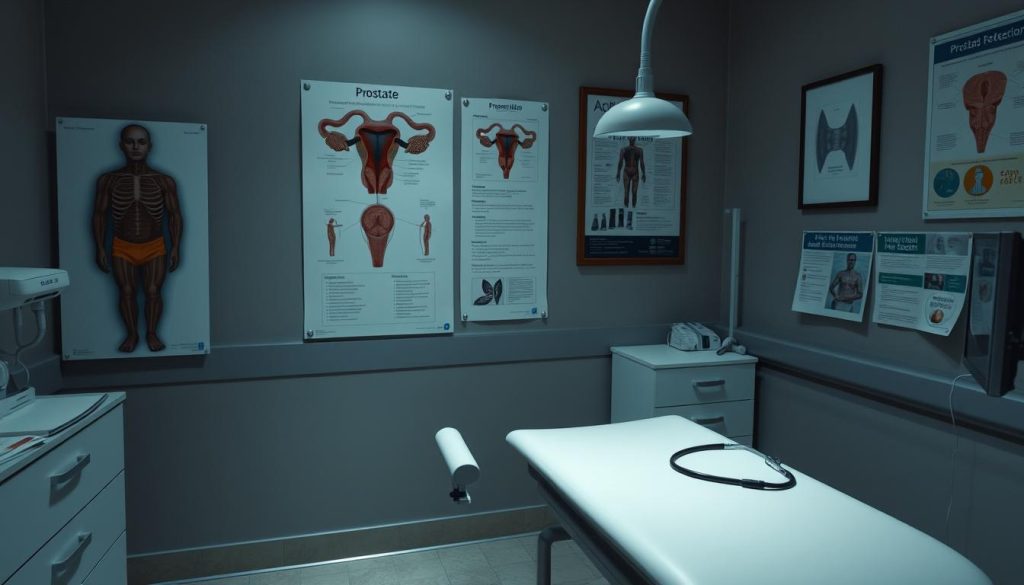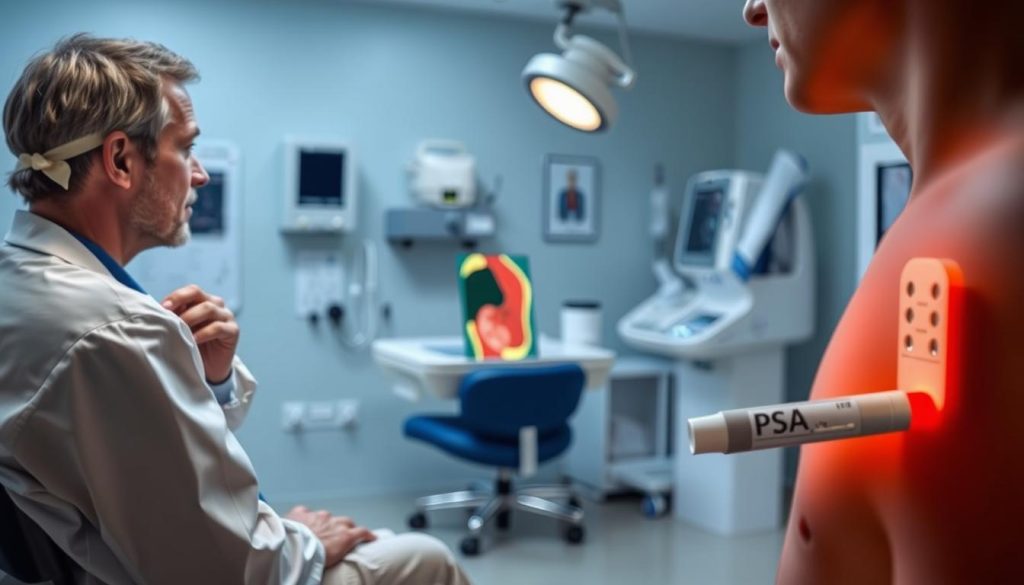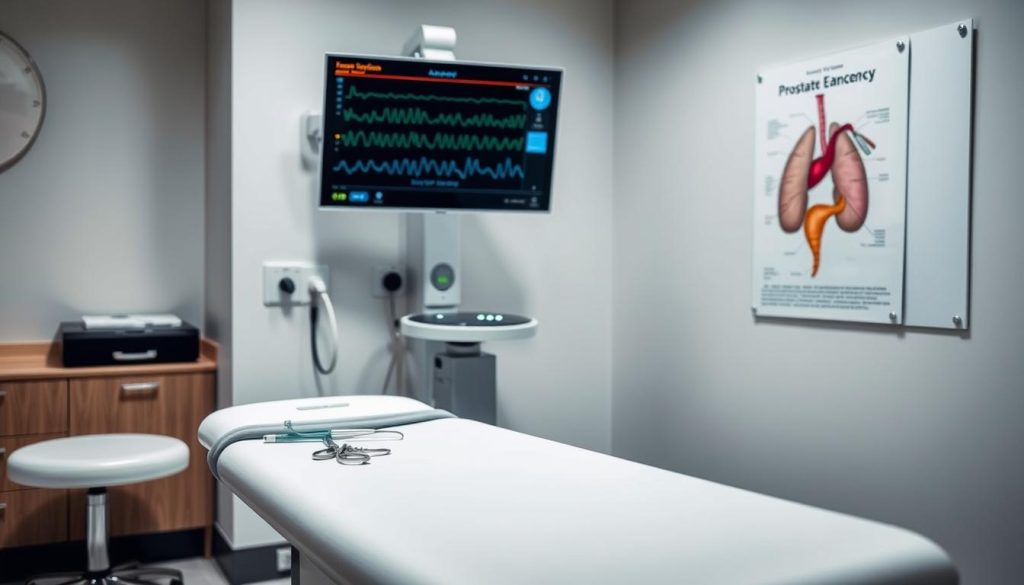Spotting prostate cancer signs can be tough, but it’s key for catching it early. This guide covers symptoms, screening, and early detection. It’s packed with important info to help you.
Prostate cancer often grows quietly, so regular check-ups are a must. Knowing the warning signs and risk factors helps with early screening. We’ll look at common symptoms, tests, and when to see a doctor.
Spotting prostate cancer early can greatly improve treatment success. This detailed guide aims to give you the knowledge to spot problems early. It’s all about taking care of your health.
How Do You Know If You Have Prostate Cancer: Early Warning Signs
Spotting prostate cancer early can lead to better treatment. It’s about noticing key changes in your body. Here are the signs you should not ignore.
Common Urinary Symptoms and Changes
Urinary problems can hint at prostate issues. Keep an eye out for:
- Frequent urination, especially at night
- Weak or interrupted urine flow
- Difficulty starting or stopping urination
- Sudden urges to urinate
Pain and Discomfort Indicators
Pain might mean prostate cancer is advanced. Be on the lookout for:
- Discomfort in the pelvic area
- Pain during ejaculation
- Bone pain, particularly in the lower back, hips, or thighs
Physical Changes That Shouldn’t Be Ignored
Some physical changes are subtle but important:
- Unexplained weight loss
- Erectile dysfunction
- Blood in urine or semen

Remember, these symptoms can also point to other health issues. If you notice any, see your doctor right away. Early detection is key, just like it is for colon cancer.
| Symptom Category | Early Stage | Advanced Stage |
|---|---|---|
| Urinary | Frequent urination, weak flow | Inability to urinate, blood in urine |
| Pain | Mild discomfort during urination | Severe pelvic or bone pain |
| Physical Changes | Slight weight loss, mild ED | Significant weight loss, severe ED |
Understanding Prostate Cancer Risk Factors
Knowing the risk factors for prostate cancer helps men make better health choices. Some risks can’t be changed, but lifestyle choices can help manage others.
Age and Family History Considerations
Age is a big factor in prostate cancer risk factors. Men over 50 are at higher risk, with the risk increasing with age. Family history also plays a role. If a close relative had prostate cancer, your risk doubles.
Lifestyle and Environmental Factors
Diet and exercise are key to prostate health. Eating a lot of red meat and dairy may increase risk. But, regular exercise can help lower it. Smoking and exposure to certain chemicals might also raise the odds of developing prostate cancer.
Genetic Predisposition and Ethnicity
Prostate cancer genetic predisposition varies among ethnic groups. African American men face a higher risk and often develop more aggressive forms of the disease. Certain gene mutations, like BRCA1 and BRCA2, can increase susceptibility.
| Risk Factor | Impact Level | Controllable? |
|---|---|---|
| Age (over 50) | High | No |
| Family History | Moderate | No |
| Diet (high in red meat) | Moderate | Yes |
| Physical Inactivity | Low to Moderate | Yes |
| Ethnicity (African American) | High | No |
Understanding these factors can guide proactive health measures. Regular check-ups and screenings become crucial as risk factors accumulate.
Essential Screening Methods for Prostate Cancer Detection
Early detection is key in fighting prostate cancer. Regular screenings can spot problems early, before symptoms show. The main tools are the prostate-specific antigen (PSA) test and the digital rectal exam.

The PSA test checks for prostate-specific antigen in your blood. High levels might mean cancer, but other issues can also cause them. Your doctor will look at your age and health history to understand the results.
A digital rectal exam lets a healthcare provider feel your prostate gland through your rectum. They look for any unusual sizes, shapes, or textures. This method can find problems that blood tests might miss.
“Regular screenings are vital for early detection. Men should discuss with their doctors when to start and how often to get tested, based on individual risk factors.”
The American Cancer Society suggests talking to your doctor about screening at:
- Age 50 for men at average risk
- Age 45 for men at high risk, including African Americans and those with a first-degree relative diagnosed with prostate cancer before age 65
- Age 40 for men at even higher risk, with more than one first-degree relative who had prostate cancer at an early age
| Screening Method | Procedure | Frequency |
|---|---|---|
| PSA Test | Blood sample analysis | Annually or as recommended |
| Digital Rectal Exam | Physical examination | Annually or as recommended |
Keep in mind, these tests aren’t a surefire way to diagnose prostate cancer. If something unusual is found, your doctor might suggest more tests to confirm or rule out cancer.
Advanced Diagnostic Tests and Procedures
Doctors use advanced methods to find and diagnose prostate cancer. These tests help decide if more action is needed, similar to breast cancer screening procedures.
PSA Testing and What Results Mean
Prostate-specific antigen (PSA) levels are crucial in prostate cancer screening. A blood test checks PSA, a protein from the prostate gland. High levels might mean cancer, but other things can raise PSA too.
| PSA Level (ng/mL) | Risk Category | Recommended Action |
|---|---|---|
| 0-2.5 | Low | Routine screening |
| 2.6-4.0 | Slightly Elevated | Monitor closely |
| 4.1-10.0 | Moderately Elevated | Consider biopsy |
| Above 10.0 | High | Biopsy recommended |
Digital Rectal Examination Process
A digital rectal exam lets doctors feel the prostate for oddities. This quick check can spot lumps or hard spots that might show cancer.
Biopsy Procedures and Imaging Tests
If first tests show worry, a prostate biopsy might be needed. This takes small tissue samples for lab checks. MRI or ultrasound can help guide the biopsy, making sure the right spots are checked.
“Early detection through advanced diagnostic procedures significantly improves prostate cancer outcomes.”
Taking Action: When to Consult a Healthcare Provider
Knowing when to see a doctor is key for catching prostate cancer early. If you notice changes in how you pee, pain, or physical changes, it’s time to go. Don’t wait for symptoms to get worse or go away by themselves.
Men with a family history of prostate cancer or in high-risk groups should be proactive. Regular check-ups and screenings are crucial, even if you feel fine. Your doctor can check your risk and suggest the right screening schedule for you.
When you see your doctor, be ready to talk about your symptoms, health history, and worries. Your doctor might do a physical exam and order tests to check your prostate. These steps help figure out if you need more tests and can spot prostate cancer early.
Early detection is crucial for better treatment options and outcomes. By acting fast and working with your doctor, you’re taking a big step in caring for your prostate. Don’t hesitate to get medical help – it could change your health journey for the better.
FAQ
Q: What are the most common early warning signs of prostate cancer?
A: Early signs of prostate cancer include frequent urination, especially at night. You might also have trouble starting or stopping urination. Weak or interrupted urine flow and blood in urine or semen are other signs. But, these symptoms can also mean other health issues, so seeing a doctor is key.
Q: At what age should men start getting screened for prostate cancer?
A: Men should talk to their doctor about prostate cancer screening at:
– Age 50 for those at average risk
– Age 45 for those at high risk, like African Americans or those with a family history
– Age 40 for those at even higher risk, like those with more than one relative with early prostate cancer
Q: What is a PSA test and how is it used in prostate cancer screening?
A: A PSA test checks the level of PSA in your blood. PSA is a protein made by the prostate gland. High levels might mean cancer. But, other things can also raise PSA levels, so it’s used with other tests for a better look.
Q: How is a digital rectal exam (DRE) performed?
A: A DRE involves a healthcare provider putting a gloved finger into your rectum. They feel your prostate gland for any odd sizes or textures that could mean cancer. It might feel a bit uncomfortable, but it’s quick and important for finding problems early.
Q: What factors increase the risk of developing prostate cancer?
A: Several things can up your risk of getting prostate cancer. These include:
– Getting older
– Having a family history of prostate cancer
– Being African American
– Certain genetic mutations, like BRCA1 and BRCA2
– Being overweight
– Smoking
– Eating a lot of fat
Q: How accurate is a prostate biopsy in diagnosing cancer?
A: A prostate biopsy is the top way to find prostate cancer. It takes small tissue samples from your prostate for a microscope check. It’s very accurate, but there’s a small chance it might miss cancer. If you still think you might have cancer after a biopsy, more tests or another biopsy might be needed.
Q: Can prostate cancer be detected through imaging tests?
A: Yes, imaging tests are key in finding and checking how far prostate cancer has spread. Common tests include:
– Multiparametric MRI for detailed prostate images
– Transrectal ultrasound to guide biopsies
– Bone scans, CT scans, or PET scans to see if cancer has spread
Q: What should I do if I’m experiencing symptoms associated with prostate cancer?
A: If you have symptoms like frequent urination or blood in urine, see your doctor right away. These signs don’t always mean cancer, but early check-ups are important for finding and treating any problems.
Q: Are there any lifestyle changes that can reduce the risk of prostate cancer?
A: Some lifestyle changes might help lower your risk of prostate cancer. These include:
– Staying at a healthy weight
– Exercising regularly
– Eating lots of fruits and veggies
– Eating less red meat and high-fat dairy
– Quitting smoking
– Talking to your doctor about medications or supplements
Q: How often should prostate cancer screening be performed?
A: How often you should get screened depends on your risk and PSA test results. Generally:
– Men aged 50-70 with normal PSA levels should get screened every 1-2 years
– Those at higher risk might need more frequent tests
– After 70, screening decisions should be based on individual needs
Always talk to your doctor to figure out the best screening schedule for you.


















